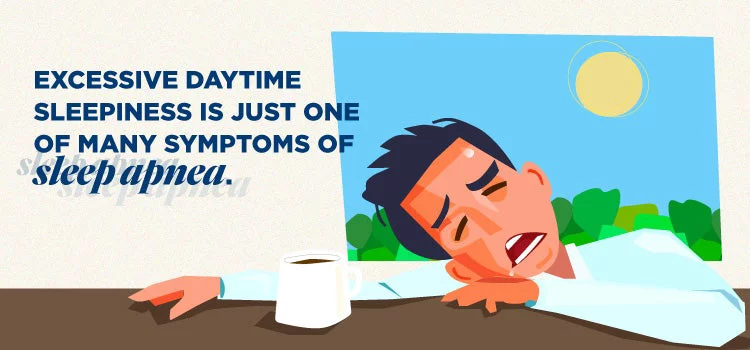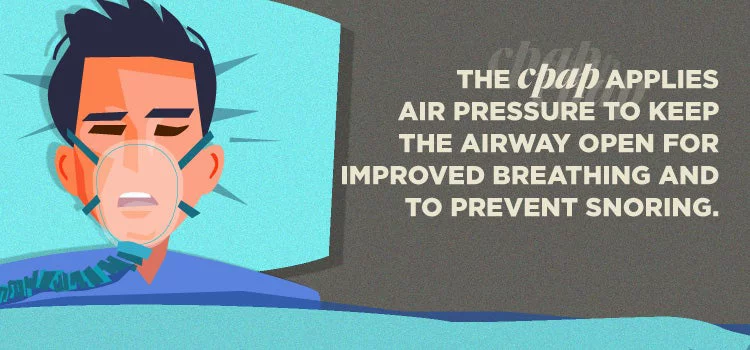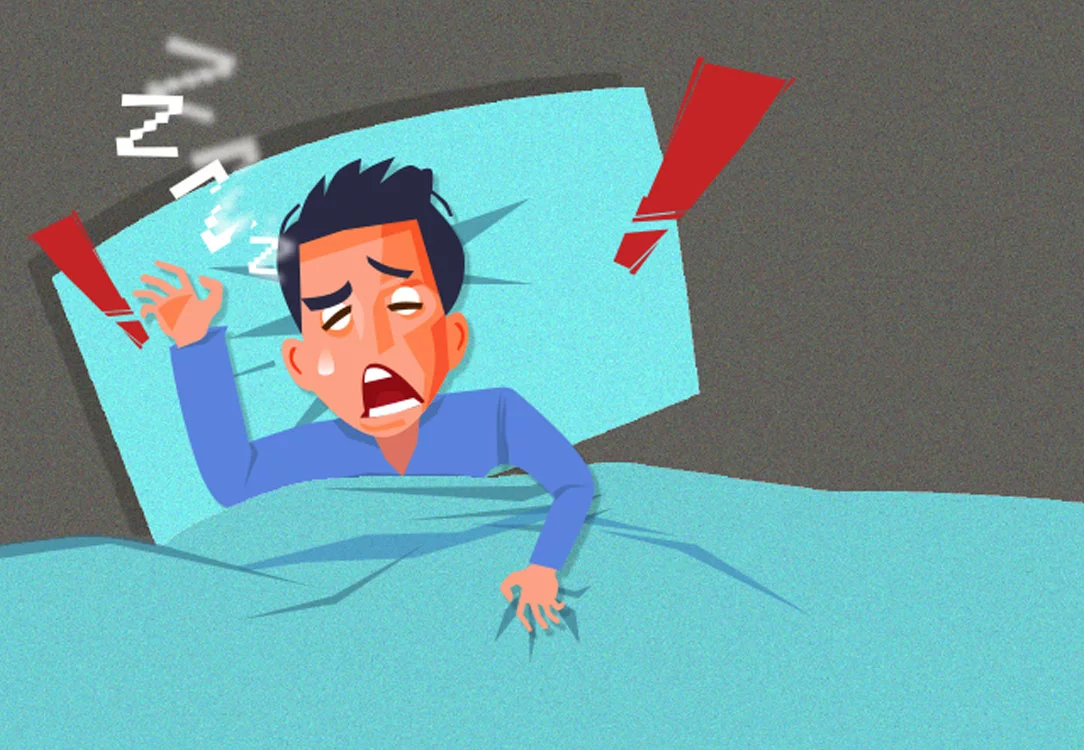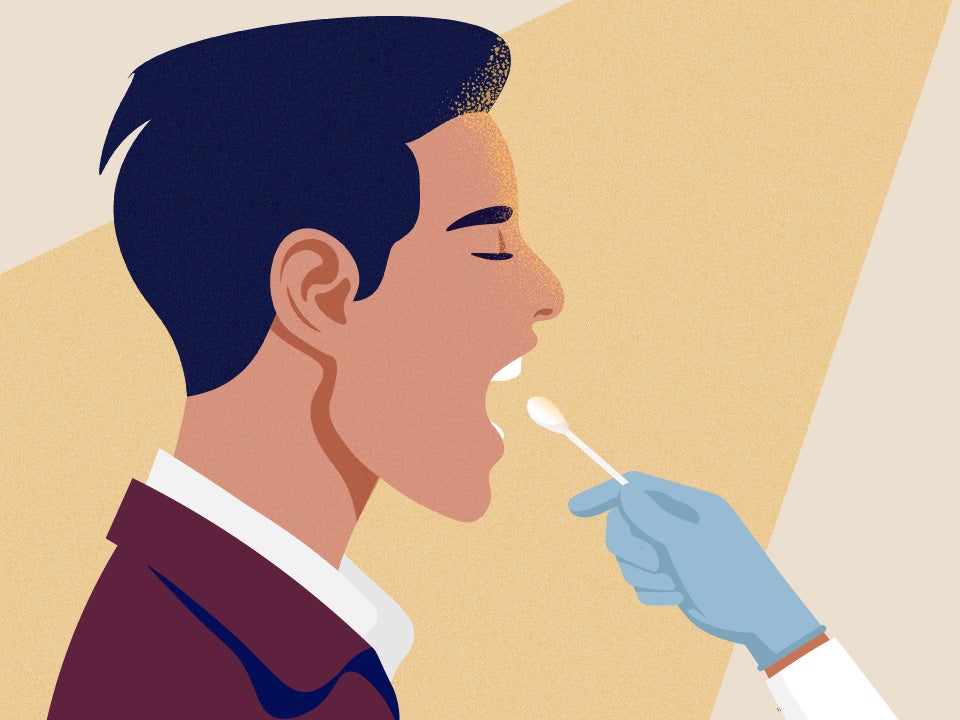What is Sleep Apnea?
The National Institute of Neurological Disorders and Stroke describes sleep apnea as a condition that causes repeated, brief interruptions of around ten seconds or more to a person’s breathing while they are sleeping. If left untreated, sleep apnea can contribute to many serious health issues, including:[ii]
- Hypertension (High blood pressure)
- Stroke
- Heart arrhythmias (irregular heartbeats)
- Cardiomyopathy (enlarged heart muscle)
- Heart failure
- Diabetes
- Obesity
- Heart Attacks

Sleep Apnea Symptoms
When it comes to sleep apnea symptoms, the list goes on and on. Good, restful sleep has everything to do with living a healthy lifestyle. When a disorder like sleep apnea constantly wakes you during the night, the sleep apnea symptoms will take a toll on your mood and your health. The Mayo Clinic lists the following symptoms for people with sleep apnea:[iii]
- Loud snoring
- Periods where breathing stops (usually noticed by another person)
- Gasping for breath during sleep
- Dry mouth
- Headaches the following morning
- Difficulty staying asleep during the night (insomnia)
- Excessive daytime sleepiness
- Problem with the attention span
- Irritability
- Night sweats
- Frequent nighttime urination [v]
- Sexual dysfunction
- Dizziness [iv]
What Causes Sleep Apnea?
Types of Sleep Apnea
Obstructive Sleep Apnea
Central Sleep Apnea
Complex Sleep Apnea
How is Sleep Apnea Diagnosed?

Sleep Apnea Treatment Options
- They are treating the related condition causing sleep apnea, like the heart or neuromuscular disorders.
- Adaptive servo-ventilation (ASV) is a machine that learns your regular breathing pattern and then maintains it once you sleep to prevent apnea.
- Surgery for tissue removal or shrinkage, jaw repositioning, implants in the soft palate, inserting a nerve stimulator to control tongue movement, tonsil removal, bariatric surgery for weight loss, or creating a new air passageway (tracheostomy).
Risk Factors & Complications
- Age: While sleep apnea can occur in anyone, from babies to the elderly, its risk increases as we get older. One reason could be how the brain controls breathing while sleeping changes as we age. Another might be how fatty tissue increases in the neck and tongue as we age.
- Lifestyle Choices: Participating in unhealthy habits like smoking, drinking, poor diet, and lack of exercise can contribute to the development of sleep apnea.
- Family History: If someone in your bloodline has sleep apnea, you could develop it, too, although healthy lifestyle choices can decrease that risk. The structure of your face and skull and how the brain controls breathing during sleep affect your risk factors also, which comes from heredity. In addition, research shows that your genes also dictate your probability of having inflammation or being obese.
- Race or Ethnicity: Sleep apnea is more common in minority groups than in Caucasians.
Are You at Risk for Sleep Apnea? Find a Dentist
To have an airway evaluation by a Smile Generation dentist who can provide a referral for a sleep apnea diagnosis from a medical professional, use our Smile Generation Find a Dentist Tool to find a trusted dentist near me.
Find your trusted, local dentist today!
Sources
[i] Sleep Apnea Information for Clinicians – Sleep Apnea. Sleepapnea.org. https://www.sleepapnea.org/learn/sleep-apnea-information-clinicians/#:~:text=A%20very%20short%20course%20on%20sleep%20apnea&text=Sleep%20disorders%2C%20including%20sleep%20apnea,severe%20obstructive%20sleep%20apnea%20undiagnosed. Accessed March 22, 2022.
[ii] Sleep Apnea: Causes, Symptoms, Tests & Treatments. my.clevelandclinic.org. https://my.clevelandclinic.org/health/diseases/8718-sleep-apnea. Accessed March 21, 2022.
[iii] Sleep apnea - Symptoms and causes. www.mayoclinic.org. https://www.mayoclinic.org/diseases-conditions/sleep-apnea/symptoms-causes/syc-20377631. Accessed March 21, 2022.
[iv] Pathak, M.D. N. Symptoms of Sleep Apnea. Webmd.com. https://www.webmd.com/sleep-disorders/sleep-apnea/symptoms-of-sleep-apnea. Published 2021. Accessed March 22, 2022.
[v] Sleep Apnea: Causes, Symptoms, Tests & Treatments. my.clevelandclinic.org. https://my.clevelandclinic.org/health/diseases/8718-sleep-apnea. Accessed March 21, 2022.
[vi] Sleep Apnea | NHLBI, NIH. Nhlbi.nih.gov. https://www.nhlbi.nih.gov/health-topics/sleep-apnea. Published 2021. Accessed March 21, 2022.
[vii] Sleep Apnea: Causes, Symptoms, Tests & Treatments. my.clevelandclinic.org. https://my.clevelandclinic.org/health/diseases/8718-sleep-apnea. Accessed March 21, 2022.
[viii] Sleep Apnea | NHLBI, NIH. Nhlbi.nih.gov. https://www.nhlbi.nih.gov/health-topics/sleep-apnea. Published 2021. Accessed March 21, 2022.
[ix] Obstructive Sleep Apnea (OSA). WebMD. https://www.webmd.com/sleep-disorders/sleep-apnea/understanding-obstructive-sleep-apnea-syndrome. Published 2021. Accessed March 21, 2022.
[x] Central Sleep Apnea. WebMD. https://www.webmd.com/sleep-disorders/sleep-apnea/central-sleep-apnea. Accessed March 21, 2022.
[xi] Benisek A. Sleep Apnea Basics. WebMD. https://www.webmd.com/sleep-disorders/sleep-apnea/sleep-apnea. Published 2021. Accessed March 21, 2022.
[xii] Ibid.
[xiii] Sleep Apnea: Causes, Symptoms, Tests & Treatments. my.clevelandclinic.org. https://my.clevelandclinic.org/health/diseases/8718-sleep-apnea. Accessed March 21, 2022.
[xiv] Ibid.
[xv] Sleep apnea - Symptoms and causes. www.mayoclinic.org. https://www.mayoclinic.org/diseases-conditions/sleep-apnea/symptoms-causes/syc-20377631. Accessed March 21, 2022.
[xvi] Sleep Apnea | NHLBI, NIH. Nhlbi.nih.gov. https://www.nhlbi.nih.gov/health-topics/sleep-apnea. Published 2021. Accessed March 21, 2022.
Smile Generation blog articles are reviewed by a licensed dental professional before publishing. However, we present this information for educational purposes only with the intent to promote readers’ understanding of oral health and oral healthcare treatment options and technology. We do not intend for our blog content to substitute for professional dental care and clinical advice, diagnosis, or treatment planning provided by a licensed dental professional. Smile Generation always recommends seeking the advice of a dentist, physician, or other licensed healthcare professional for a dental or medical condition or treatment.








